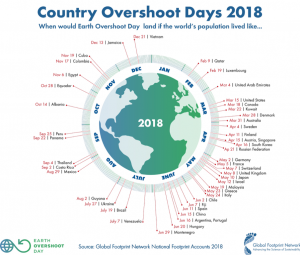Reducing One’s Carbon Footprint
16 September 2019 | BY Lachlan Umbers, UWA | Do My Actions Make a Difference?
Rising global temperatures threaten an array of alarming consequences, from the eradication of animal and plant species due to habitat loss, through to millions of human deaths due to increasingly frequent natural disasters and the spread of disease (among other things). The ideal solution would almost certainly be for states to enter into a fair, enforceable agreement for the aggressive reduction of greenhouse gas emissions.
The Paris Agreement, which enshrined a target of containing global warming to no more than 1.5-2°C above pre-industrial average temperatures, was an important step in the right direction. Yet numerous studies have now concluded that the emissions-reduction pledges made by the nations party to the Paris agreement would not be sufficient to contain global warming to 1.5-2°C (Rogelj et al. 2016). And, even if they were sufficient, no major industrialised nation is presently on track to meet its pledges, in any case (Victor et al. 2017). The most recent estimates suggest that global temperatures are on track to rise by somewhere between 2-4.9°C by 2100 (Raftery et al. 2017), risking a great many severe harms.
In light of this, it is hard to disagree that it would be good if more people reduced their personal carbon footprints by altering their consumption habits, driving less frequently, and so on. Many also believe something stronger, however: that sufficiently affluent individuals have a moral duty to reduce their personal carbon footprint, and that those who fail to do so are doing something morally wrong. A Reuters/IPSOS poll conducted in February 2015, for example, found that 72% of Americans agreed with the idea that individuals were “personally morally obligated” to reduce their emissions in their daily lives.
This idea is intuitively attractive. After all, it is widely accepted that individuals have duties not to cause harm to others. That, presumably, is why assault, theft, and murder are paradigmatically wrongful actions. Humanity’s excessive greenhouse emissions are the principal cause of climate change and its attendant harms. Perhaps, then, individuals have duties to reduce their emissions to ensure that they do not do harm to others.
Yet many think this simple argument is problematic. As Walter Sinnott-Armstrong (2005) has forcefully pointed out, climate change is a classic collective action problem. Humanity’s overall greenhouse emissions are very damaging. Yet the fraction of total emissions traceable to each person is miniscule. Each person’s decision as to whether to reduce their emissions, then, is very unlikely to make any difference to the severity of climate change – and, as such, is unlikely to cause harm to anyone.
In the face of such concerns, is there any sense to be made of duties to reduce one’s carbon footprint? Some (Sinnott-Armstrong, 2005) say no, insisting that only governments have duties to take action on climate change. Others, however, are unwilling to surrender so easily.
A promising idea on this front has been explored in recent literature by the philosophers Steve Vanderheiden (2016) and (more tentatively) Garrett Cullity (2015). Both point out that we often have duties to perform certain actions for reasons that have nothing to do with causing harm to others. Suppose George fare-evades on a public bus. He clearly does something wrong. Yet he cannot be said to be harming anyone. His fellow passengers would be no better off if he paid the fare. True, he deprives the government of a small amount of revenue – but hardly enough to make a difference to what the government is able to do for its citizens.
The complaint against George, rather, is that he is a free-rider. The expectation that passengers will pay the fare ensures that the bus service is able to operate in the first place. George treats his fellow passengers unfairly by claiming a special privilege for himself – free travel – while depending upon others to forego that privilege for themselves.
Perhaps our duties to reduce our personal carbon footprints are similar. All over the world, people are engaged in the struggle against climate change. Many have begun to practice ‘green consumption’, for example, altering their purchasing habits in an attempt to reduce their impact upon the environment, for example (Erhardt-Martinez et al. 2015, pp. 113-5).

These efforts will not, by themselves, prevent serious climate change from occurring. But, collectively, they plausibly make some difference to both humanity’s overall emissions (and thus to the severity of climate change), and to governments’ willingness to pursue more aggressive climate policies. Failing to contribute to these efforts by continuing to live a high-emission lifestyle, then, plausibly amounts to free-riding. In this way, perhaps, such individuals treat others unfairly. Since it is wrong to treat others unfairly, it is wrong for individuals to fail to reduce their carbon footprints.
Opponents of this argument usually point out that there is a disanalogy between fare-evasion, and failing to reduce one’s carbon footprint. Fare-evaders fail to contribute to efforts to produce the good of public transport, from which they themselves benefit. Those who fail to reduce their emissions fail to contribute to efforts avoid serious climate change. Yet, the principal beneficiaries of such efforts will be other people – in particular, future generations.
This argument invites two responses. First, the idea that mitigating climate change will not benefit presently existing citizens is highly controversial, given that the effects of climate change are already being felt in many parts of the world. Second, even supposing this were not so, we routinely judge people to have acted unfairly where they fail to contribute to efforts to produce important goods for others. If Jessica stands idly on a beach watching someone drown in the surf, while everyone else is engaged in a rescue effort, it seems perfectly right to think that she has a duty of fairness to contribute, too.
Another standard objection points out that high-emitters have generally not asked those who lead climate-conscious lives to make such efforts. Consider an example lightly adapted from the libertarian philosopher Robert Nozick (1974, pp. 90-6). Suppose Harish sets up a radio station in his backyard. His neighbours might enjoy listening in. Yet they surely don’t have any duties to help pay for the station’s upkeep. After all, Harish’s neighbours didn’t ask for the radio station, and their listening in has cost him nothing.
Yet backyard radio stations are rather trivial goods. If Harish had instead dug a well to provide fresh water to the street where none would otherwise have been available, we should certainly think his neighbours obliged to assist him, whether they had asked him to dig the well or not. Clearly, preventing dangerous climate change is a matter of great importance, and thus rather more like contributing to digging a well than running a radio station.
A final and more subtle challenge is that the argument frames persons’ the wrong of failing to reduce one’s emissions not as a matter of their impact upon the climate but, rather, as a matter treating others unfairly. Yet, perhaps, that cannot be the right explanation of such duties. We think that we have duties to do something to help combat climate change. All this argument seems to show is that we have duties to help climate activists.
Yet, proponents of the fairness argument are likely to respond that this simply asks the impossible. If any adequate justification of a duty to reduce our emissions must appeal to the impact each individual’s efforts will have upon the climate, no such justification is likely to be available. For those interested in rescuing the idea that individuals have duties to help do something about climate change, the appeal to fairness plausibly represents the best that can be done.
References
Australian Government, Tackling Australia’s food waste, Department of the Environment and Energy, <https://www.environment.gov.au/protection/waste-resource- recovery/food-waste>
Broome, J. 2014. Climate Matters: Ethics in a Warming World, W.W. Norton & Company, New York, NY.
Caniglia, B. S. Brulle, R. J. Szasz, A. 2015 ‘Civil Society, Social Movements, and Climate Change. in Dunlap, R. E. Brulle, R. J. (Eds.) Climate Change and Society: Sociological Perspectives. Oxford, UK: Oxford University Press.
Cullity, G. 2015. ‘Acts, omissions, emissions’ in Moss, J. (ed.) Climate Change and Justice. Cambridge, UK: Cambridge University Press.
Erhardt-Martinez, K. Schor, J. B. Abrahamse, W. Alkon, A. H. Axsen, J. Brown, K. Shwom, R. L. Southerton, D. Wilhite, H. 2015 ‘Consumption and Climate Change’ in Dunlap, R. E. & Brulle, R. J. (eds.) Climate Change and Society: Sociological Perspectives. Oxford, UK: Oxford University Press.
Kunzig, R. 2014 The Sixth Extinction: A Conversation With Elizabeth Kolbert, National Geographic, <https://news.nationalgeographic.com/news/2014/02/140218-kolbert-book-extinction-climate-science-amazon-rain-forest-wilderness/>
Lawford-Smith, H. 2016 ‘Difference-Making and Individuals Climate-Related Obligations’, in Hayward, C. Roser, D. (eds.) Climate Justice in a Non-Ideal World. Oxford, UK: Oxford University Press.
Nozick, R. 1974. Anarchy, State, and Utopia, USA, Basic Books.
Raftery, A. E. Zimmer, A. Frierson, D. M. W. Startz, R. Liu, P. 2017 ‘Less than 2 °C warming by 2100 unlikely’, Nature Climate Change, pp. 637–641, Vol.7.
Rogelj, J. Elzen, M. D. Höhne, N. Fransen, T. Fekete, H. Winkler, H. Schaeffer, R. Sha, F. Riahi, K. Meinshausen, M. 2016 ‘Paris Agreement climate proposals need a boost to keep warming well below 2 °C’, Nature, 534, pp.631-639.
Sinnott-Armstrong, W. 2005 ‘It’s Not My Fault: Global Warming and Individual Moral Obligations’ Advances in the Economics of Environmental Research, Vol.5, pp.293-315.
Vanderheiden, S. 2016 ‘Climate Change and Free Riding’, Journal of Moral Philosophy, Vol.13, pp.1-27.
Victor, D. G. Akimoto, K. Kaya, Y. Yamaguchi, M. Cullenward, D. Hepburn, C. 2017 ‘Prove Paris was more than paper promises’, Nature, Vol.548, pp.25-27.
Wallace, B. 2015 Most Americans see combating climate change as a moral duty, Reuters,

